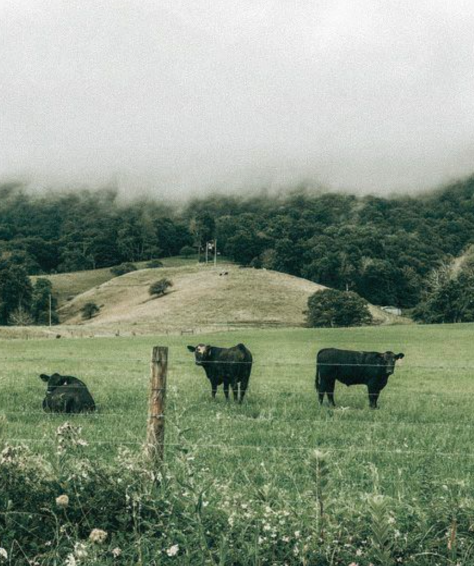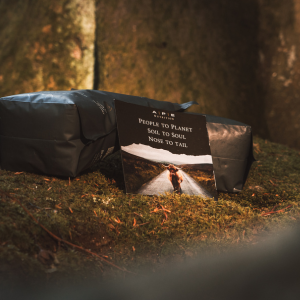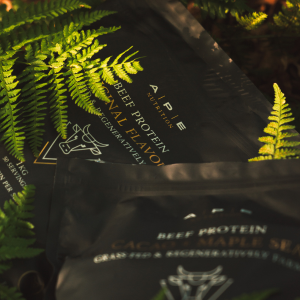Following the amazing response to Dr Jenny Goodman's interview on the Altered States Podcast (if you haven't seen it, here's the link: https://www.youtube.com/watch?v=QxflhZYa8eY), we decided to do a follow up Q&A. We reached out to our followers on Instagram for questions for Jenny and she very kindly took time to answer. There were a lot of really great questions with really insightful answers so we thought it would be a good idea to turn the Q&A into an article. Here it is...
Q1 - What do you think of general farming/meat standards in the UK?
A1 - Well, I’m not an expert on comparative standards around the world, but I do know that Britain has higher welfare standards than the US, and now that we have left the EU our own standards may drop. It used to be illegal in the UK to add hormones to animal feed, because that was the EU rule; it may change now. And we’re importing more from the USA and other places, with lower standards. BUT there is in huge and growing “Regenerative Farming” movement in the UK, with loads of farmers trying to be organic, humane and ecological in the way they work. If you keep animals in good conditions, with natural food and freedom
to roam, they don’t get ill and don’t need antibiotics added to their feed. Check out “Groundswell”, the annual conference of the farmers who are trying to do it better. Most farmers have the will; the main obstacle is government subsidies, which are going to the factory-farms instead of the small, ecologically conscious farms which are increasing both biodiversity and animal welfare standards. See pp 29-33 in my book, “Staying Alive in Toxic Times: A Seasonal Guide to Lifelong Health”.
Q2 - Should women change our diet as we get older?
A2 - Probably you will find you need to do this, yes. After menopause our hormonal status changes, and we need more exercise and less food in order to keep the weight off, compared to in our 20s, 30s and 40s. It’s not fair, but there it is. We need to reduce, but not cut out, carbohydrates. They should be whole not refined, eg brown not white rice, potatoes with the skins on (organic of course!) etc, and a greater emphasis on protein, good oils (see appendix of my book) and veg, veg, veg! The hypothalamus in the brain seems to rejig the “set point” for weight after 50; you may stabilise at a higher weight than before, but so long as it is stable, don’t worry too much. My criteria are: can you climb a mountain, and can you run for a bus? If you can do these without trouble, you’re ok! Bones need extra help once we pass 50; they need Vitamin D3 to increase the absorption of
calcium from the gut into the bloodstream, and they need Vitamin K2 to get that calcium from the bloodstream into the bone. But you do NOT need calcium supplements; they’re a bad idea. See p 220 and 227-230. Lots more on preventing osteoporosis etc.
Q3 - Can you overfeed babies real food nutrients?
A3 - Well, I doubt it, but would need to know more about what the questioner is worrying about? Breastfed babies never take more than they need, and if you supplement with real food, like avocado, banana, cooked mashed courgette, organic chicken broth and so on, I can’t see that there’ll be a problem. Eat healthily yourself, and from the age of 6 months let them grab off your plate!
Q4 Limits to micronutrients - can you overdose?
A4 - Excellent question. You can’t really overdose on the water-soluble vitamins, Vitamin C and the B vitamins, because you pee out whatever your body can’t use that day. Re Vit C, see p305 of my book for how to build up to your own personal maximum tolerated dose. And overdose of magnesium is theoretically possible but very unlikely because most of us are deficient; we pee it out when we’re stressed. But all other nutrients, yes, you can overdose. Fat-soluble vitamins - A, D, E and K – theoretically you can take excess. In practice, I’ve seen too-high levels of Vit A, Vit D, and Vit E only once each in 22 years of practice. Pregnant
women, however, should avoid Vitamin A supplements; children in the developing world tragically go blind for lack of Vitamin A, but in the West overdose is more likely to be the issue. Women of a certain age take too many calcium supplements, encouraged by GPs who don’t know that calcium pushes out magnesium, and that the way to ensure good calcium levels in the bones is not to take calcium, but to have good levels of Vitamins D3 and K2. Zinc, selenium, chromium, copper, iron and other minerals are essential, but you can overdose. For these minerals the dose recommended on the pot is usually fine, BUT please note that it will probably be much higher than the government’s Recommended Daily Allowances, which are ludicrously low, as explained on pp 248-250. The normal range of Vitamin D in your blood should be 75-200 nano-mols/litre; don’t let your GP tell you that a level below that is ok – it isn’t. That’s if you can persuade your GP to measure it in the first place – but they really should. A good Vit D level helps prevent cancer, heart disease, autoimmunity, viral infections, brain deterioration - but GPs mostly only know that the bones need it.
Q5 - Top three book recommendations?
A5 - (I’m assuming I should not include my own book here!)
- Sustainable Medicine by Dr Sarah Myhill
- Curing the Incurable by Dr Jerry Thompson
- Nutrition and Mental Health, ed by Martina Watts.
Q6 - What is the link between the gut and the brain?
A6 - There are many links! First, the gut produces 60% of our “happiness hormone”, serotonin. Second, the vagus nerve (10 th cranial nerve) connects the brain with the gut in both directions: messages travel from the brain to the gut; if you’re stressed, you can’t digest. (Because stress activates the sympathetic nervous system (fight/fright/flight) which is evolved to help us run away, not eat! Whereas to “rest and digest” we need to be in the parasympathetic state). And vice versa, if your gut is in a mess – excess sugar, unfriendly bugs, leaky gut, constipation etc – then you can’t think clearly or feel happy. Thirdly, if you
have leaky gut, and undigested fragments of protein are getting through into your
bloodstream, some of those peptides may act as weird neurotransmitters, and affect your mood and behaviour quite profoundly. There is a vast amount of info on this now – look up “Gut-Brain Axis”.
Q7 - How to treat GERD/Acid Reflux
A7 - GERD is Gastro-Oesophageal Reflux Disease, called GORD in the UK (oesophagus not esophagus). First thing is to check that the diagnosis is correct, because this condition is being vastly over-diagnosed at the moment, and many people are needlessly being put on PPI (Protein Pump Inhibitor) drugs like Omeprazole that cause a lot of damaging side effects, including osteoporosis and, ironically, gut symptoms. We need our stomach acid! Without it we cannot kill any bad microbes we accidentally ingest, we cannot digest protein and we
cannot absorb our minerals. So suppressing acid production with drugs is bad news. If there really is acid reflux, and it’s causing “heartburn” - pain in the chest behind the sternum - then the first thing to do is to work out why the stomach contents are going up instead of down. This may be postural, eg eating in a hurry hunched over a desk or rushing around, rather than sitting straight (or even standing, if the reflux is really bad) or strolling gently, in order to let gravity assist with digestion. Or it may be anatomical, ie there is hiatus
hernia, in which case do not eat in the 4 hours before bed, and raise the head of the bed on bricks so your head is higher than your feet – again, letting gravity assist digestion. Taking magnesium carbonate powder in water will neutralise the acid safely (some pharmacological preps for this contain aluminium or bismuth, which are toxic) but temporarily, without suppressing acid production. Slippery Elm is an immensely useful herb too, taken as tea or as powder in water, not capsules, because you want it to touch the sides of the oesophagus (gullet). It helps heal up the sore gut lining. Medical herbalists can use many other herbs for this as well. More info about this on the website of my colleague Dr Sarah Myhill, who has a brilliant concept called “The half-acid stomach”. Her theory is that the stomach is actually producing too little acid, therefore there is not sufficient acid to open the pylorus, the sphincter at the lower end of the stomach which leads into the small intestine. Acid is the trigger for this opening, and if there is not enough, then the pylorus stays shut, and the peristaltic waves of the stomach’s muscular wall will instead send the stomach contents back up into the oesophagus. However, even though there is not enough acid for pyloric opening, there is enough to cause pain - heartburn. Even a tiny amount will do this; because the oesophagus, unlike the stomach, has no defence against acid. Long-term, reflux of acid up into the oesophagus can cause chronic inflammation, Barrett’s Oesophagus, which is a pre- cancerous condition. So this needs expert help.
Q8 - The three most important changes for long-term health?
A8 -
- Make sure you are doing meaningful work that you love, and that creates happiness in yourself and others.
- Exercise outdoors in green spaces, taking time to notice the birds, the trees, the sky.
- Follow the 4 golden rules in the Intro to my book: Eat organic, real, free-range food, eat your greens, cut out sugar and cut out artificial additives.
Q9 - Anti-nutrients in vegetables?
A9 - Cross this off your worry list! Technically it is true that lectins and other problematic substances occur in some plant food – but in grains and pulses more than vegetables – but so do a thousand vital, essential, health-promoting substances! Nature isn’t perfect but she’s pretty damn good. Grains and pulses need to be cooked very thoroughly, and I think that destroys any potentially problematic substances. The point is, we have been eating plants for millions of years – what we have NOT been eating for millions of years are pesticides. So eat organic and don’t worry!
Q10 - Sea moss gel and bladderwrack as supplements?
A10 - Essentially seaweed, a valuable food that coastal dwellers have always eaten. An excellent source of iodine. Just check out that it has come from a relatively clean part of the ocean, and not somewhere radioactive like, say, Fukoshima. You want ordinary iodine, but you absolutely don’t want radioactive iodine.
Q11 - How to recover from long-term antibiotic treatment?
A11 - 20 years on Erythromycin. Gosh. I would get a stool test from Doctor’s Data lab or Genova (Genova has a UK office) to see what unfriendly yeasts and other bugs have grown. They will test to see which herbs will help deal with those particular ones. And after you’ve done that, of course take probiotics, rotating different types/brands every 3 months to maximise variety and cover all your bases. If you need to continue the antibiotics, just take the probiotics at a different time of day, to reduce the risk of the antibiotics killing the good bugs. But on 2nd thoughts, no point doing the stool test until/unless you are finally off the antibiotics.
Q12 - How to rebalance hormones after coming off the Contraceptive Pill?
A12 - Tricky. You may not need to do anything, or you may need to consult a medical herbalist for this (National Institute of Medical Herbalists) – it depends how long you were on the Pill for, and to what extent it has suppressed your natural cycle. One woman’s cycle will bounce back immediately, another may take a year or two to get back to biological normal. If you are in your thirties and want children, and your cycle has not ‘bounced back’, don’t delay; do see a herbalist. Of course good nutrition and exercise help too, but they may not be sufficient. Nutrition-wise, zinc is often very low after years on the Pill, and copper too high; a good nutritional therapist should be able to diagnose and treat this common problem. See the Pre-Conception Care section of my book; it starts on p 148.
Q13 - Advice for women taking HRT for menopause.
A13 - Eat lots of brassica veg, like broccoli, kale, cauliflower, cabbage, Brussels sprouts and watercress. They contain DIM (Di-Indolyl Methane) and Sulphoraphanes, natural plant chemicals which tend to keep oestrogen and progesterone in their safe, non-carcinogenic form. Even more protective are sprouted broccoli seedlings – get Bio-Snacky broccoli Rapini seeds from The Natural Dispensary. Really easy to grow – details on pp 77-78 of the book.
They contain 50 x more of these good substances per gram than does mature broccoli! You can also get DIM as a supplement. Iodine also helps to keep oestrogen etc in the safer form, as do raspberries and grapefruit. Make sure you have good levels of Vitamin D, and omega 3 oils (fish oils) and the good omega 6 oils (Evening Primrose oil). All these measures are also protective against breast cancer, and can be used whether you are on HRT or not, but if you are on HRT I think they’re vital, and ditto if you have a family history of breast cancer. If you do have that family history, HRT is risky. I know hot flushes etc are horrid, but no woman can safely take HRT forever, so it’s good to start exploring alternatives. A 5-stage approach to menopause is described in my book, beginning on p 222.
And if you do decide to come off HRT, get help from a qualified medical herbalist. Herbs can really ease the transition.
Q14 - What's the best way to assess cholesterol levels?
A14 - Some GPs just check total cholesterol, but many will also check triglycerides, HDL (high density lipoproteins) and LDL (low density lipoproteins). The NHS tend to panic people needlessly, by setting the upper acceptable limit of cholesterol too low, at around 5. What actually matters, re your risk of blood clots (heart attack, stroke etc), is whether or not your cholesterol is oxidised. If you eat loads of anti-oxidant foods, ie raw fruit and veg, it won’t be. Beware of statins, the cholesterol-lowering drugs, which are a 30 billion dollar industry. GPs are giving them out like smarties. They stop your body making cholesterol (which we actually need for brain, bile, and the production of hormones and Vitamin D) AND they stop you making Co-Enzyme Q 10, a vital nutrient without which your energy level falls. If your cholesterol really is too high, a competent nutritional therapist can help.
Q15 - Is it worth eating non-organic fruit and veg from the supermarket?
A15 - No. They are full of insecticides and pesticides. Get an organic veg box delivered weekly from your local organic farm or from Riverford or Abel & Cole. To be sure it is truly organic, it must have the Soil Association logo on it. Then you can trust it. Riverford is the one I use, and it’s fantastic. And any veg box is likely full of produce that’s in season, not imported, which is good; don’t expect organic strawberries in the box in January!
Q16 - How to help Rheumatoid Arthritis?
A16 - First – check there is no MOULD in your house. Make sure kitchen and bathroom are warm and very well ventilated. Damp creates mould which can trigger arthritis. Second, check your diet. Try avoiding all the common RA culprits for a few months: wheat, dairy, red meat, sugar, citrus fruit and tomatoes. Third, consult a nutritional therapist and/or a Chinese herbalist/acupuncturist – they are very good with this. Fourth, if you have metal amalgam fillings (mercury) consider getting them SAFELY replaced with white fillings by a specialist dentist, whom you can find via the IAOMT – International Academy of Oral Medicine and Toxicology. RA is auto-immune, and can be triggered by mercury and/or moulds. Avoid
aluminium too – that’s in deodorants, aluminium pots and pans, aluminium foil and, dare I say it, the flu jab. Aluminium, like mercury or any heavy metal, can trigger autoimmunity. Finally, in the July edition of the excellent magazine “What Doctors Don’t Tell You”, there will be a case history about Rheumatoid Arthritis, by me. I hope it helps!
If you found this interesting and want to learn more, here a link to Jenny's book (which is in my personal top recommended reads): https://www.yellowkitebooks.co.uk/titles/jenny-goodman/staying-alive-in-
toxic-times/9781529309799/






